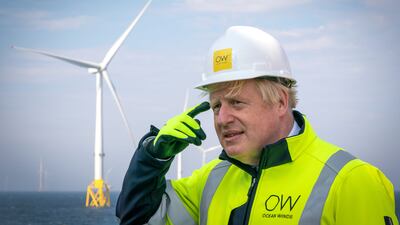UK Prime Minister Boris Johnson is insisting that oil contracts should not be ripped up amid controversy over a deal to explore a new field as the UK prepares to host a climate change conference.
Authorities are considering whether to allow drilling in the Cambo oilfield off the west coast of Scotland, which contains an estimated 170 million barrels of oil.
An exploration licence was granted in 2001 but the industry regulator is yet to decide whether to give the go-ahead for extraction.
The opposition Labour party and environmental activists are calling for the project off the Shetland Islands to be scrapped as the country seeks to move to a low-carbon future.
The government has promised to scrap oil projects that do not align with its climate change goals but faces embarrassment over signing off on the deal before the Cop26 conference in Scotland later this year. The government said it is committed to becoming a net-zero economy by 2045.
Mr Johnson was questioned about the project when he and opposition leader Keir Starmer visited wind farms in Scotland on Thursday.
"This was a contract that was signed in ... was agreed in 2001 and we can't just tear up contracts, there is a process to be gone through,” Mr Johnson said.
Mr Starmer told BBC Scotland that the Cambo development should not go ahead.
“The idea that we have a global conference here at the same time as approving Cambo doesn't make any sense – it gives off completely the wrong signal."
Mr Johnson stoked further controversy when he cited the closure of coal mines under former leader Margaret Thatcher as a sign that the UK was committed to moving to renewable energy.
“Look at what we’ve done already. We’ve transitioned away from coal in my lifetime. Thanks to Margaret Thatcher, who closed so many coalmines across the country, we had a big early start and we’re now moving rapidly away from coal altogether”.
The closure of the mines in the 1980s divided communities and plunged some of the UK’s least wealthy communities into long-term economic depression. Industrial action led to clashes with police amid high tensions between strikers and those who crossed picket lines.
The episode led to long-term and entrenched opposition to the Conservative Party in the UK’s industrial heartlands. Mr Johnson won national elections in 2019 based on winning over some of those communities and breaching the so-called Red Wall that had long backed Mr Starmer’s Labour Party.
First Minister of Scotland Nicola Sturgeon described the comments as “crass and deeply insensitive” while Labour demanded an apology.


